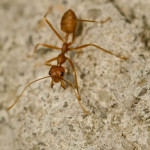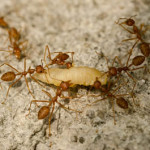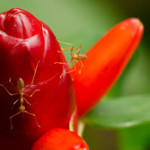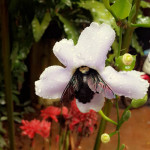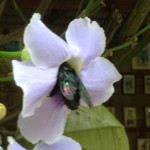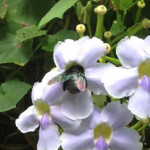Red Grasshawk (Neurothemis fluctuans)
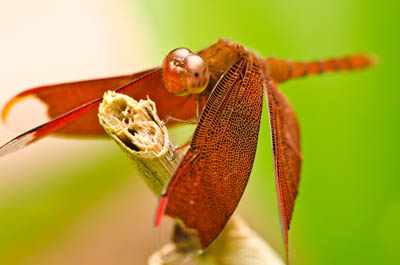
Image Copyright David Vinot
Last Observed: February 2015, Koh Chang
Observed By: David Vinot
The Red Grasshawk, also known as the Common Parasol and the Grasshawk Dragonfly is a brilliantly-coloured member of the dragonfly family. Their four wings give them complete mastery of flight, including the ability to hover and even to fly backwards.
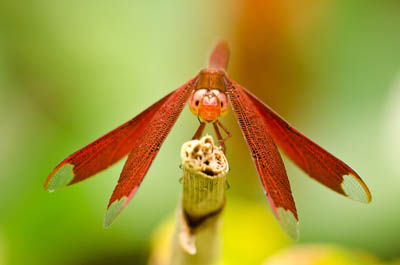
Image Copyright David Vinot
Red Grasshawk Wikipedia
Weaver Ant (Oecophylla smaragdina)
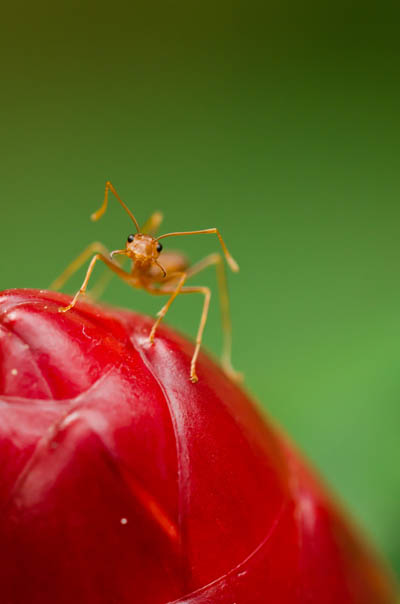
Image: David Vinot
Last Observed: February 2015, Koh Chang
Observed By: David Vinot
The small but hardy Weaver Ant is a commonly seen insect on Koh Chang. They make nests in trees from leaves that are stitched together with silk produced by their larvae – hence the name.
Weaver Ant Wikipedia
Image Copyright David Vinot
Image Copyright David Vinot
Image Copyright David Vinot
Cercopidae callettix versicolor
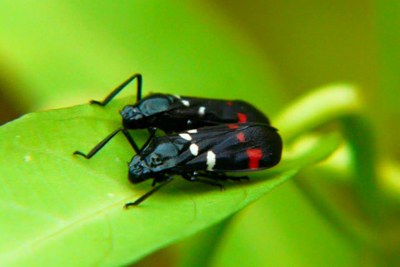
Image Copyright Coco Trilo
Last Observed: November 2015, Koh Chang
Observed By: Coco Trilo
This black beetle has very distinctive red and white markings on its wing carapace.
It is a member of the Cercopidae family of beetles commonly, and pleasingly, know as frghoppers.
Cercopidae Wikipedia
Yellow Leopard Moth (Dysphania Militaris)
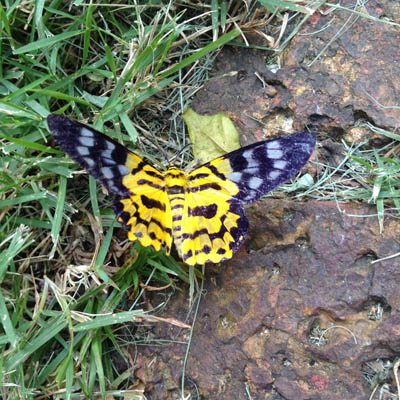
Image: Perry Stevens
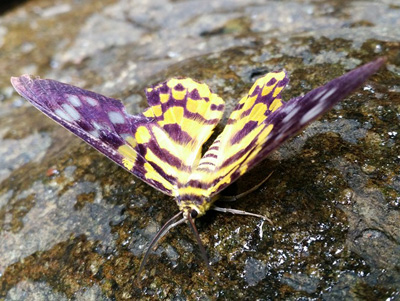
Image Copyright Paweena Khamsap
Last Observed: December 2015, Koh Chang
Observed By: Paweena Khamsap, Perry Stevens
The brightly coloured Yellow Leopard Moth is often mistaken for a butterfly firstly because it flies during the day and secondly due to its uncharacteristically bright colouration. But it isn’t. It’s a moth. A moth with delusions of grandeur maybe, but still a moth.
Yellow Leopard Moth Wikipedia
Lesser-Banded Hornet (Vespa affinis)
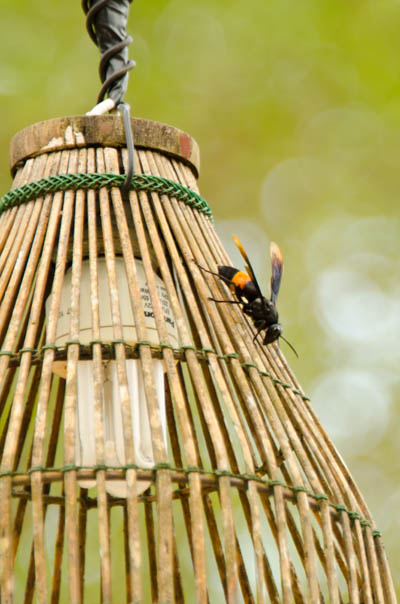
Image Copyright David Vinot
Last Observed: February 2015, Koh Chang
Observed By: David Vinot
Not to be confused with the Greater-Banded Hornet (the bands are… less) the Lesser-Banded Hornet is a native Koh Chang insect species.
Hornets are a sub-family of wasps that have a venom that is slightly more painful to humans. they are also able, like bees and wasps to summon the whole nest to attack by releasing a special attack pheremone.
Hornets Wikipedia
Tussock Moth (Calliteara horsfieldii)
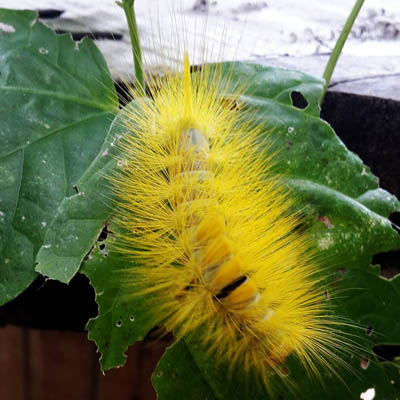
Image Copyright Perry Stevens
Last Observed: 2015, Koh Chang
Observed By: Perry Stevens
This super-hairy caterpillar eventually develops into the Tussock Moth.
Tussock Moth natureloveyou.sg
Tropical Swallowtail Moth (Lyssa zampa)
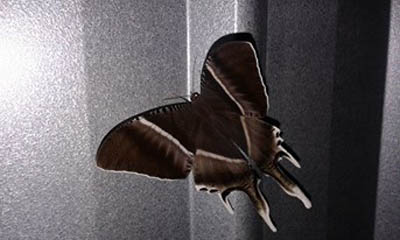
Image Copyright Tijl Adriaen
Last Observed: November 2015, Koh Chang
Observed By: Tijl Adriaen, Hans-Henrik Hansen
The Tropical Swallowtail Moth is a large member of the moth family uraniidae with a wingspan of up to 16cm.
Tropical Swallowtail Moth Wikipedia
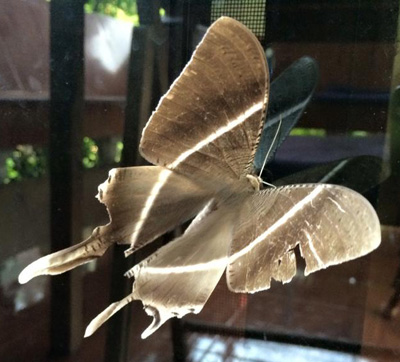
Image Copyright Hans-Henrik Hansen
Tropical Carpenter Bee (Xylocopa latipes)
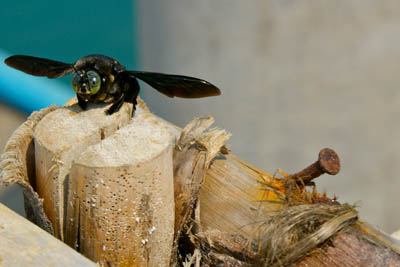
Image: David Vinot
Last Observed: 2015, Koh Chang
Observed By: Paitoon Praiboung, Perry Stevens, David Vinot
The Tropical Carpenter Bee is a large solitary dwelling bee that lives in burrowed holes in wood or in bamboo stems. It is one of the largest bees in the world and Koh Chang is a perfect habitat for it.
And get this, they mate on the wing!
Tropical Carpenter Bee Wikipedia
Image Copyright Perry Stevens
Image Copyright Paitoon Praiboung
Image Copyright Paitoon Praiboung
Wasp Moth (Euchromia polymena)
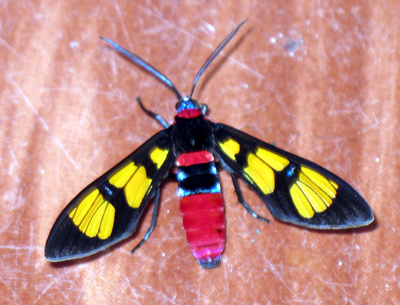 Last Observed: 2008ish, Koh Chang
Last Observed: 2008ish, Koh Chang
Observed By: Dave Hinchliffe
This stunningly-coloured moth looks like a bee or a wasp on first observation. It is also known as the Tiger Moth, but doesn’t look all that much like a tiger – must be the colour?
It is found in India, southeast Asia and parts of Australia.
Wasp Moth Wikipedia
The Rusty Palmking – Amathusia Masina
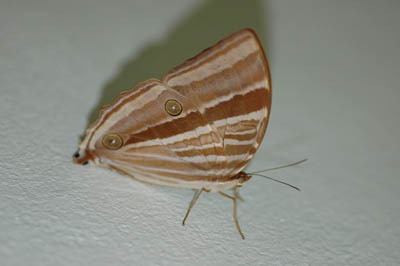
Image Copyright David Newman
Last Observed: November 2015, Koh Chang
Observed By: David Newman
The Rusty Palmking is a large butterfly that is a member of the jungle-dwelling Amathusia family of butterflies and is one of over 1,100 species of butterfly found in Thailand.
Amathusia Wikipedia




